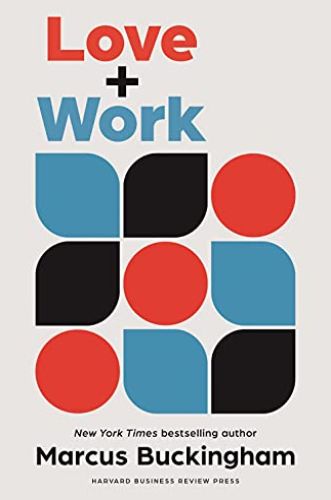In this heartfelt and deeply personal work – in many ways unlike anything he’s written before – Marcus Buckingham delivers his most impassioned and emotional plea for finding work, relationships and a life you truly love.

Your Loves Are Calling
New York Times bestselling author and researcher Marcus Buckingham writes from the heart about knowing yourself deeply and following your true passions. He writes what he knows: His own remarkable successes, both professional and personal, have hinged on discovering and prioritizing his loves. Backed by cutting-edge research, he makes a passionate appeal to do what you love in a world designed to suppress – and separate you from – your true self. Buckingham’s insights prove powerful: While his previous books – such as StandOut and First, Break All the Rules – offered exceptional insights, this one exceeds them in its authenticity and potential impact.
Know Yourself Deeply
Most people live their entire lives never understanding their own gifts, Buckingham believes. Systems at school and work intentionally treat people as interchangeable, encourage conformity and thwart people’s passions. Parents, teachers and managers push people to improve their weaknesses instead of growing in areas where they have natural strengths. This distracts people from their loves, and they gradually lose touch with what excites and fulfills them. Eventually, neglect causes these loves to wither and disappear.
To do anything great in your life, you will have to take seriously what you love and express it in some sort of productive way.Marcus Buckingham
Buckingham exhorts you to love what you do. He wants you to thrive – to experience life in its fullest form. He admits you can have an outwardly successful life, achieve a great deal and acquire wealth without ever discovering or pursuing your loves – but ultimately, he implores, do you really want to live a life that’s false to your core?
Express Your Unique Loves – and Break the Rules
Buckingham doesn’t tell you to simply follow your passions, whatever the cost, and trust that somehow, someday, it will all pay off. Instead, he bases specific recommendations on millions of data points he’s gathered as a researcher specializing in employee talents, employee engagement, team effectiveness, leader effectiveness and performance. For example, he advises you to make sure you do some things you love every day at work and to aim for a job that makes you feel excited about going – and explains the data that backs up this advice.
Your life, lived fully, is the search for the strongest possible connection between what you feel – your loves – and what you give to others – your work.Marcus Buckingham
Sure, you say – maybe if you have an Ivy League degree and control over your work. But Buckingham has also researched the least-appreciated jobs – such as hotel room cleaners – and found that the highest performers love certain aspects of their work. They find pride and even excitement in their jobs. High performing room cleaners, for example, enjoy doing special things for their guests, such as arranging stuffed animals in different poses for the kids – even if they have to break rules to do them. Ultimately, these workers gain enjoyment and satisfaction by finding ways to express their unique loves in their work.
Explore Your Infinite Uniqueness
Buckingham references neuroscience to show there can never be another individual like you – ever. Your parents’ chromosomes, he explains, interacted randomly in determining your genome, which shaped the specific structure of your brain. You possess about 100 billion neurons, and each of these connects to at least 1,000 others – so your brain has around 100 trillion connections. Your wiring, in other words, is unique and unrepeatable. You have far more differences than similarities to anyone else, even an identical twin.
You aren’t a category. You don’t fit into a category, unless we’re talking about a category of one.Marcus Buckingham
Given this, Buckingham says, you owe it to yourself and the world to explore your uniqueness and to learn about what you love. Genes, not environment, he emphasizes, determine your loves. And the more you do the things you love, the more your brain creates corresponding synaptic connections that support these activities. In turn, it becomes easier to learn and improve in these areas.
Pay Attention
Only you can determine your loves, because only you can perceive their signals – the emotions and experiences that tell you when you’re touching on a topic or activity you love. First, you’ll often feel an instinctual draw toward things you love: You’ll walk into a certain place or hear about a certain opportunity, for example, and know it’s right for you. Second, you’ll experience the feeling of immersion and loss of time that psychologist Mihaly Csikszentmihalyi called flow. Third, you’ll often experience rapid learning in an area you love, partly because you’ll feel absorbed in and highly motivated by the activity.
Buckingham implores you to pay attention to the calls of your loves – listen for and hear the signals. Ask yourself what work you reflexively volunteer for, and what always makes you feel good when you do it. What kind of work do you have to be torn away from? What subjects inexplicably grab your interest? Once you discover a “red thread” – an area or activity that seems to have a positive charge for you – explore it further. Identify the specific conditions under which you find pleasure and absorption.
When you do something or make something with love, Buckingham says, it feels a bit like romantic love. Similar chemicals release in your brain, and much like a person in love, you find yourself pulled toward the activity. Time passes quickly, and you find flow and feelings of connection and immersion. The results will reflect your love: People will sense the emotion behind your work and want more of it.
Start paying attention to what you find yourself paying attention to.Marcus Buckingham
Don’t let your strengths fool you into thinking they must also be your loves, Buckingham warns. You may love the things you’re good at – but not always. And don’t fall prey to the notion that you should give your weaknesses lots of attention. Weaknesses drain your energy, even when you excel at them, and they make time seem to move more slowly – the opposite of flow.
Help Others Find Their Loves
Buckingham encourages you to help others – your children, students and employees – discover and embrace their loves, too. Not doing this, he says, often represents the greatest failure of families, schools and workplaces. Schools, he advises, should help kids discover their loves – not suppress them just to make things easier for teachers and administrators. And parents shouldn’t obsess about markers comparing their kids’ progress to others, including grades and tests. They should spend time with their kids, observing the countless signals they communicate about their passions, especially while they’re very young. Parents should ask their kids about their loves, and listen to their answers.
A career is not a ladder, nor a lattice, nor a jungle gym. A career is a scavenger hunt for love.Marcus Buckingham
At work, managers should help workers create goals for themselves that align with the organization’s objectives. When employees’ work aligns with their loves, managers can expect higher-quality work, more optimism, better employee engagement, greater collaboration and far less attrition.
Give Love a Chance
Some of Buckingham’s advice might feel far-fetched, such as to turn down a good job on principle if an interviewer doesn’t communicate enough love. And many people merely have strong interests at work, not the love Buckingham describes. He admits people rarely love everything about their jobs, but reassuringly cites data showing people can love their work, even if the parts they love constitute just 20% of their typical day. At the very least, Buckingham’s guidance should encourage you to focus your energies as much as possible on your true, deep-seated and unique passions in a world that drives us to insignificant, and even toxic, distractions.










